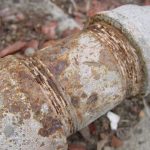When the water will not pass into the drain and it sits in the sink, tub or shower stall, it can be annoying. But, that dirty standing water is also unhealthy and it can be a challenge to clear it. In many cases, you can drain the water by scooping it out and then use a simple cup plunger to move the water trapped in the drain. A more formidable clog can be removed with a plumbing snake or auger that you can find in most home improvement stores. But, like many aspects of modern life, prevention is better than the cure, and it makes good sense to protect your plumbing system. In this article, we will look at three ways to protect your drains from clogs.
1. Monitor and Change Your Drain Habits
Many people use their drains as a kind of narrow garbage disposal, but this is a bad way to treat your drainage system. A drain line is only designed to remove waste water and very low levels of material that it may be carrying. Let’s take a closer look at some common items or substances that should never be placed in the drain. They are coffee grounds, eggshells, “flushable” wipes, paper towels, cotton balls, seeds, pits and F.O.G. (Fats, Oil and Grease). If you and others in the home can avoid placing these items in the drain or flushing them in the toilet, you can avoid many clogging issues.
2. Install Drain Strainers
It’s a great idea to install drain strainers in every drain in your home to block materials that could enter the drain line. If you don’t want to place a drain strainer in every drain, there are two that you should prioritize. They are the kitchen sink and the shower/tub. These two locations are the main areas where material, such as: grime, hair, floss, nail clippings, food particles and other material can get into the drains. A drain strainer is inexpensive, but when you consider the time, money and hassle that they can prevent they are well worth the modest investment.
3. Don’t Use Chemical Drain Cleaning Products
If you look at the packaging of a chemical drain cleaning product, you will notice warnings to avoid them touching your skin. These products contain harsh caustic chemicals that can cause burns and they are equally hard on your plumbing pipes. Many people reach for chemical cleaners as a quick and easy solution to their problems, but this is a bad idea. Over time, the chemicals can damage your pipes leading to more serious issues and an expensive repair bill. This is why a professional plumber will always prefer a manual clog removal and chemical cleaners are avoided. A kinder approach is to pour a cup of baking soda followed by a cup of white vinegar in the drain. This will cause a gentle chemical reaction, leave it for 20 minutes and flush with warm (not hot) water. This process can be repeated a few times if it doesn’t work immediately.
If you have a drain clog that you cannot remove, contact your local professional plumber for expert help today.





